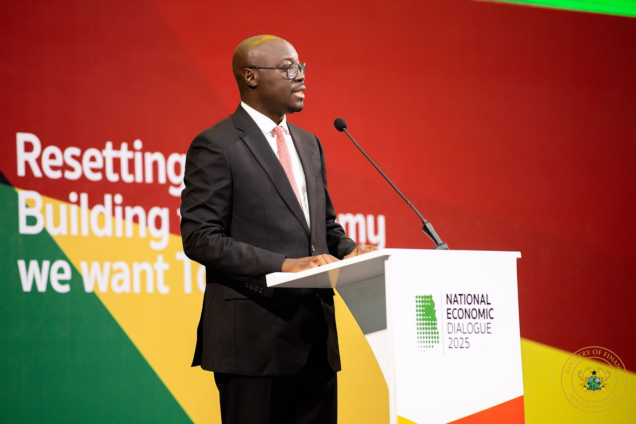
Audio By Carbonatix
Dr Cassiel Ato Baah Forson, the Minister of Finance, Monday unveiled what he says is a comprehensive strategy aimed at resetting Ghana’s economy through rigorous structural reforms.
The Minister emphasised the urgent need for fiscal discipline and sustainable growth, describing the current macroeconomic situation as “very fragile.”
The announcement was made during the inaugural day of the National Economic Dialogue held at the Accra International Conference.
In a detailed presentation, the Minister outlined seven key focus areas designed to address the nation’s economic challenges.
These included enhanced domestic revenue mobilisation, which would involve strategies to broaden the tax base and improve collection efficiency, ensuring a balance between equity, simplicity, and efficiency.
The Minster said the government also planned to achieve quantitative fiscal consolidation through controlled borrowing and reduced costs, allowing for increased investment in national development.
“Ensuring compliance with public financial arrangements and public procurement rules is another critical area, with a focus on strengthening financial governance and promoting transparency in public spending,” he said.
“Additionally, the Government aims to enhance the efficiency of public spending and social programmes by optimising resource allocation to maximise value for money and ensure fiscal adjustment.”
Dr Forson announced plans to phase out costly, regressive, and ineffective subsidies in the energy sector, transitioning towards targeted social programmes to protect vulnerable populations while reducing fiscal strain.
“Reforming state-owned enterprises (SOEs) is another priority, with specific attention given to addressing contingent liabilities and reducing fiscal burdens in entities like Cocoa Board and the Electricity Company of Ghana,” he said.
He revealed government’s decision to working on strengthening Ghana’s fiscal framework by redesigning fiscal rules and enhancing automatic stabilizers to contain budget fragilities and address revenue year market issues.
The Minister stressed the importance of discipline and a long-term perspective, urging citizens to recognise that “short-term benefits we gain today have long-term consequences for our future.”
He acknowledged the ineffectiveness of fiscal policy over the past eight years and called for a “momentum for reforms,” emphasising that the “quality of adjustment will be key to support growth and protect the poor and most vulnerable.”
“The new reforms are intended to address the current economic climate, particularly the high cost of borrowing and the need to channel dividends to support national development,” he said.
Latest Stories
-
Ghana is rising again – Mahama declares
5 hours -
Firefighters subdue blaze at Accra’s Tudu, officials warn of busy fire season ahead
5 hours -
New Year’s Luv FM Family Party in the park ends in grand style at Rattray park
5 hours -
Mahama targets digital schools, universal healthcare, and food self-sufficiency in 2026
5 hours -
Ghana’s global image boosted by our world-acclaimed reset agenda – Mahama
6 hours -
Full text: Mahama’s New Year message to the nation
6 hours -
The foundation is laid; now we accelerate and expand in 2026 – Mahama
6 hours -
There is no NPP, CPP nor NDC Ghana, only one Ghana – Mahama
6 hours -
Eduwatch praises education financing gains but warns delays, teacher gaps could derail reforms
6 hours -
Kusaal Wikimedians take local language online in 14-day digital campaign
7 hours -
Stop interfering in each other’s roles – Bole-Bamboi MP appeals to traditional rulers for peace
7 hours -
Playback: President Mahama addresses the nation in New Year message
8 hours -
Industrial and Commercial Workers’ Union call for strong work ethics, economic participation in 2026 new year message
10 hours -
Crossover Joy: Churches in Ghana welcome 2026 with fire and faith
10 hours -
Traffic chaos on Accra–Kumasi Highway leaves hundreds stranded as diversions gridlock
10 hours

